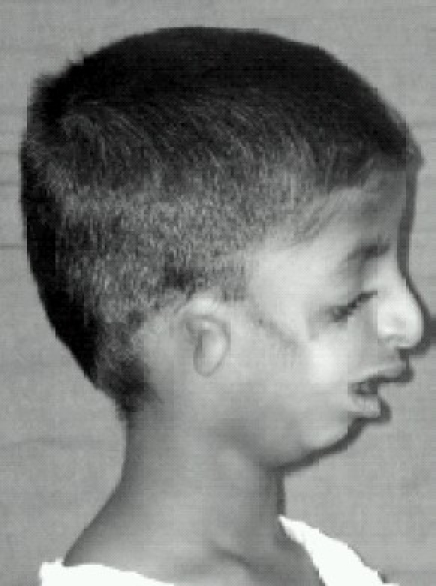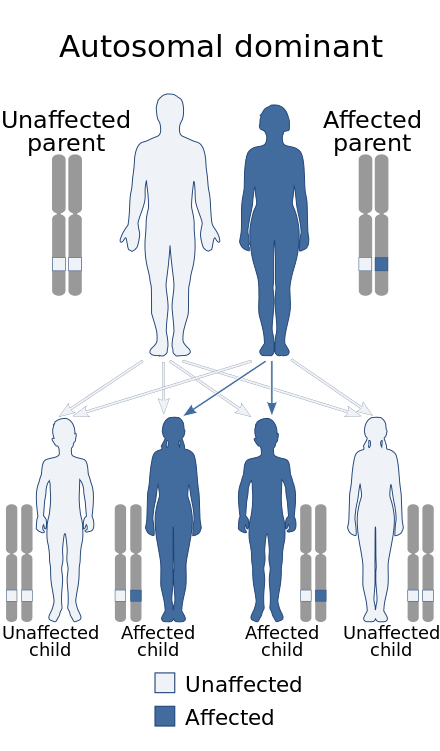Treacher Collins Syndrome
Treacher Collins syndrome (TCS), also known as Treacher Collins–Franceschetti syndrome or mandibulofacial dysostosis, is a genetic disorder primarily affecting craniofacial development. It is characterised by deformities of the ears, eyes, cheekbones, and chin, with severity ranging from mild to severe.
Complications may include breathing difficulties, vision problems, cleft palate, and hearing loss, although intelligence is typically unaffected. TCS occurs in approximately 1 in 50,000 people.

Signs and Symptoms
The symptoms of Treacher Collins syndrome vary widely among individuals. Key features include underdevelopment of the lower jaw (mandible) and zygomatic bones, leading to a sunken appearance of the cheeks. The small mandible can cause dental occlusion issues and, in severe cases, difficulty breathing or swallowing. External ear deformities are common, ranging from small, rotated, or malformed ears to the complete absence of the external ear canal. Consequently, many affected individuals experience conductive hearing loss.

Eye abnormalities include downward angled eyelids, coloboma (notches) in the lower eyelids, partial or complete absence of lower eyelashes, and narrowing of tear ducts. Vision loss can occur due to strabismus, refractive errors, anisometropia, or frequent eye infections resulting from dry eyes. Other features include cleft palate, dental anomalies, and, less frequently, nasal deformities, high-arched palate, and congenital heart defects. Despite facial deformities, over 95% of individuals with TCS have normal intelligence.
Genetics
Treacher Collins syndrome is usually inherited in an autosomal dominant manner, primarily caused by mutations in the TCOF1 gene, with POLR1C and POLR1D mutations accounting for a smaller percentage of cases. TCOF1 mutations lead to haploinsufficiency of the treacle protein, essential for ribosome assembly, resulting in reduced neural crest cell precursors and affecting facial bone and tissue development.

Diagnosis
Diagnosis of TCS is based on clinical findings, genetic testing, and radiographic evaluation. Characteristic symptoms are often observed during a physical exam, but TCS can resemble other disorders, making differential diagnosis essential. The OMENS classification system is used to describe distinct dysmorphic manifestations, including orbital asymmetry, mandibular hypoplasia, auricular deformity, nerve development, and soft-tissue disease.
Radiographic techniques such as orthopantomograms, lateral cephalometric radiographs, and occipitomental radiographs can confirm jaw abnormalities and hypoplasia of facial bones. Temporal-bone CT scans help diagnose ear canal stenosis, middle ear cavity status, and ossicular malformations.
Treatment
Management of TCS involves multidisciplinary intervention to address breathing, feeding, hearing, and facial deformities. Reconstructive surgeries are performed at various developmental stages:
- Cleft palate repair: 9–12 months old
- Zygomatic and orbital reconstruction: 5–7 years old
- External ear reconstruction: at least 8 years old
- Maxillomandibular reconstruction: 6–16 years old, depending on severity
- Orthognathic treatments: after 16 years old
- Nose reconstruction: after 18 years old
Hearing loss is typically managed with bone conduction amplification, speech therapy, and bone-anchored hearing aids. Psychological support is very important to address anxiety, depression, social phobia, and body image distress associated with TCS.
Epidemiology
Treacher Collins syndrome occurs in about one in 50,000 births in Europe, with worldwide estimates ranging from one in 10,000 to one in 50,000 births.
History and Culture
The syndrome is named after Edward Treacher Collins, an English surgeon who described its traits in 1900. Cultural references include the novel and film "Wonder," documenting the life of a child with TCS, and various documentaries and media features raising awareness about the condition.
Self-assessment MCQs (single best answer)
What is the primary area affected by Treacher Collins syndrome?
Which gene is most commonly mutated in Treacher Collins syndrome?
What type of inheritance pattern does Treacher Collins syndrome follow?
Which of the following is not a common feature of Treacher Collins syndrome?
At what age is zygomatic and orbital reconstruction typically performed in individuals with Treacher Collins syndrome?
Which diagnostic tool is used to confirm jaw abnormalities in Treacher Collins syndrome?
What percentage of individuals with Treacher Collins syndrome have normal intelligence?
Which of the following is a common complication in individuals with Treacher Collins syndrome?
In which year did Edward Treacher Collins first describe the traits of the syndrome?
What type of hearing aid is typically used to manage hearing loss in Treacher Collins syndrome?
Dentaljuce
Dentaljuce provides Enhanced Continuing Professional Development (CPD) with GDC-approved Certificates for dental professionals worldwide.
Founded in 2009 by the award-winning Masters team from the School of Dentistry at the University of Birmingham, Dentaljuce has established itself as the leading platform for online CPD.
With over 100 high-quality online courses available for a single annual membership fee, Dentaljuce offers comprehensive e-learning designed for busy dental professionals.
The courses cover a complete range of topics, from clinical skills to patient communication, and are suitable for dentists, nurses, hygienists, therapists, students, and practice managers.
Dentaljuce features Dr. Aiden, a dentally trained AI-powered personal tutor available 24/7 to assist with queries and provide guidance through complex topics, enhancing the learning experience.
Check out our range of courses, or sign up now!


